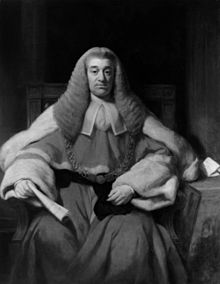Nicholas Conyngham Tindal
British politician and lawyer (1776-1846)
Sir Nicholas Conyngham Tindal, PC (12 December 1776 – 6 July 1846) was a celebrated English lawyer who successfully defended the then Queen of the United Kingdom, Caroline of Brunswick, at her trial for adultery in 1820. As Chief Justice of Common Pleas, an office he held with distinction from 1829 to 1846, he was responsible for the inception of the special verdict "Not Guilty by reason of insanity" at the trial of Daniel M'Naghten.

Quotes
edit- We should not be too strict in construing instruments or contracts generally drawn up on the spur of the moment.
- Newbery v. Armstrong (1829), 3 M. & P. 513.
- It is fraud in law if a party makes representations which he knows to be false, and injury ensues, although the motives from which the representations proceeded may not have been bad.
- Foster v. Charles (1830), 7 Bing. 105.
- Whatever is injurious to the interests of the public is void, on the grounds of public policy.
- Horner v. Graves (1831), 7 Bing. 743.
- Whatever restraint is larger than the necessary protection of the party, can be of no benefit to either, it can only be oppressive; and if oppressive, it is, in the eye of the law unreasonable.
- Horner v. Graves (1831), 7 Bing. 743
- It is to be remembered that contracts in restraint of trade are in themselves, if nothing more appears to show them reasonable, bad in the eye of the law.
- Horner v. Graves (1831), 7 Bing, 744.
- There is no reason for assuming, that the time of medical men and attornies is more valuable than that of others whose livelihood depends on their own exertions.
- Lonergan v. The Royal Exchange Assurance (1831), 9 Bing. 731; remarking on the payment of expert witnesses.
- The intention of the testator is the polar star by which we must be guided.
- Wilce v. Wilce (1831), 5 M. & P. 694; quoting Sir Francis Buller, 1st Baronet, J., Smith v. Coffin (1795), 2 Hen. Bl. 444.
- Judicial decisions in Courts of justice are ranked by Lord Hale as one of the grounds or constituents of the common law.
- Balme v. Hutton (1833), Moore & Scott's Rep. 61, referring to Hale's "History of the Common Law," c. 4.
- Illegality is not to be presumed; it is to be alleged and proved when it does not appear on the face of the instrument itself.
- Lord Howden v. Simpson (1839), 10 A. & E. 821; reported in James William Norton-Kyshe, Dictionary of Legal Quotations (1904), p. 103-104.
- Immemorial enjoyment is the most solid of all titles.
- In the Matter of the Serjeants-at-Law (1840), 6 Bing. New Cases, 238.
- It is between the stirrup and the ground, Brother; but you may amend by replying.
- Spincer v. Spincer (1841), 5 Jur. (0. S.) 102.
- Every Court is the guardian of its own records, and master of its own practice.
- Scales v. Cheese (1844) 12 M. & W. 687.
- It will appear, no doubt, that at various periods of our history there have been decisions as to the nature and description of the religious solemnities necessary for the completion of a perfect marriage, which cannot be reconciled together; but there will be found no authority to contravene the general position, that at all times, by the common law of England, it was essential to the constitution of a full and complete marriage, that there must be some religious solemnity; that both modes of obligation should exist together, the civil and the religious.
- R. v. Millis (1844), 10 CI. & Fin. 655.